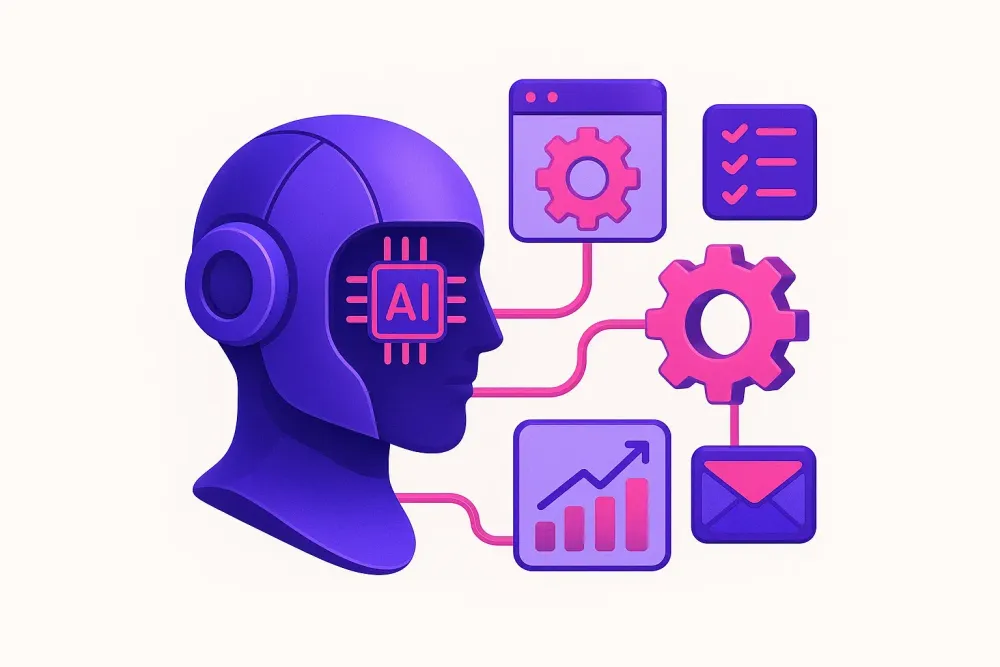Home
Services
Products
Projects
Who We Are
Blogs
Contact Us

Revolutionizing Business with AI-Powered Automation: 6 Key Areas and Best Practices
AI-powered automation is rapidly transforming businesses, promising a 21% net increase to the U.S. GDP by 2030. Its impact spans numerous sectors, from customer service and supply chain optimization to cybersecurity and personalized marketing. Let's explore the key areas where AI is making a significant difference and how businesses can effectively leverage this technology.
Six Key Areas of AI-Powered Business Transformation:
- Customer Service Revolution: AI-powered chatbots and virtual assistants provide instant, personalized support, eliminating frustrating wait times and call transfers. This leads to improved customer satisfaction and increased efficiency.
- Data-Driven Decision Making: Advanced AI algorithms process massive datasets with speed and accuracy, extracting meaningful insights that inform strategic decision-making. This data-driven approach empowers businesses to optimize operations and gain a competitive edge.
- Supply Chain Optimization: AI streamlines inventory management, demand forecasting, and logistics, resulting in reduced costs, improved efficiency, and timely deliveries. This optimization enhances customer satisfaction and strengthens the entire supply chain.
- Automating Repetitive Tasks: AI efficiently handles mundane, time-consuming tasks, freeing up human employees to focus on higher-level, strategic initiatives. This boosts productivity, improves job satisfaction, and fosters a more innovative workforce.
- Enhanced Cybersecurity: AI algorithms proactively identify and respond to security threats, detecting anomalies and mitigating risks before they escalate. This robust approach safeguards sensitive data and protects businesses from evolving cyberattacks.
- Personalized Marketing Success: AI analyzes customer preferences and behavior to deliver targeted advertisements and personalized recommendations, increasing engagement, conversion rates, and overall marketing ROI. This approach fosters stronger customer relationships and boosts sales.
Best Practices for Implementing AI-Powered Automation:
- Define Clear Objectives: Establish specific, measurable, achievable, relevant, and time-bound (SMART) goals to guide your AI implementation. Focus on areas where AI can deliver the greatest impact.
- Conduct Thorough Data Analysis: Analyze existing data to pinpoint opportunities for AI-driven improvements. Identify data gaps and develop strategies to address them.
- Start Small and Scale Gradually: Begin with pilot projects to test AI solutions and refine your approach before widespread implementation. This minimizes risk and maximizes learning.
- Select the Right AI Technology: Choose AI solutions that align with your specific business needs, offering proven track records and scalability. Thoroughly vet potential vendors.
- Invest in Employee Training and Upskilling: Equip your workforce with the knowledge and skills to effectively utilize AI tools. Address concerns and foster a culture of acceptance.
- Proactive Risk Management: Anticipate potential challenges, including data privacy concerns, ethical dilemmas, and employee resistance. Develop mitigation strategies beforehand.
- Continuous Performance Monitoring and Optimization: Regularly monitor AI system performance, adjusting parameters and processes as needed to maintain optimal efficiency and effectiveness.
- Stay Ahead of the Curve: Keep abreast of the latest advancements in AI technology to ensure your strategies remain competitive and innovative.
Case Studies: Real-World Applications of AI-Powered Automation:
- Tesla: Autonomous Driving: Tesla’s integration of AI into its autonomous driving systems exemplifies the transformative power of AI in the automotive industry. Advanced algorithms, coupled with sensor data, enable features like Autopilot, constantly learning and improving through data analysis.
- Meta: Content Moderation: Meta utilizes AI to moderate billions of daily user-generated content, effectively identifying and removing hate speech, violence, and other harmful material. This demonstrates AI's role in creating a safer online environment.
Overcoming Challenges in AI Adoption:
- Data Accessibility: Address data limitations by implementing robust data collection mechanisms and potentially establishing data partnerships.
- Technical Expertise: Invest in talent acquisition, training, and collaboration with AI specialists to bridge the skills gap.
- Ethical Considerations: Establish clear ethical guidelines, conduct regular audits, and ensure transparency in AI decision-making processes.
- Integration Complexity: Plan meticulously, invest in scalable infrastructure, and conduct thorough testing to ensure seamless integration with existing systems.
- Change Management: Implement effective change management strategies, communicate openly with employees, and provide adequate training to minimize disruption and foster buy-in.
The Future of AI-Powered Automation:
The future of AI-powered automation is bright, promising further advancements across various industries. Expect increased collaboration between humans and machines, leading to enhanced productivity and innovation. Data-driven decision-making will become even more prevalent, empowering businesses to make informed choices and gain a competitive edge. Personalized experiences will become the norm, fostering deeper customer relationships and driving revenue growth. Embracing AI's potential is crucial for future success. Explore DEFX's resources to learn more about leveraging the power of AI.
See More
Contact Us
Let’s make your Idea into Reality
Let's Talk
© Copyright DEFX. All Rights Reserved
GoodFirms ★ 4.2
Clutch ★ 4.2
Google ★ 4.2
